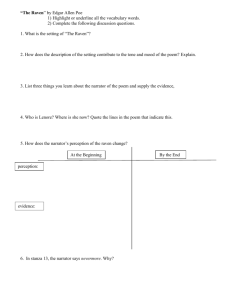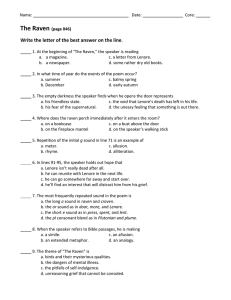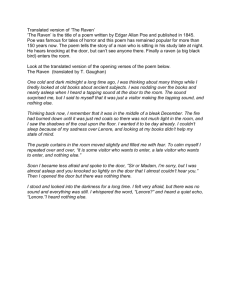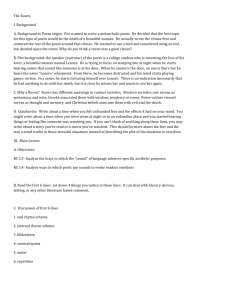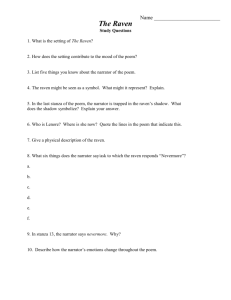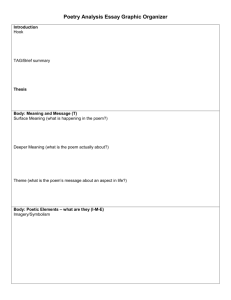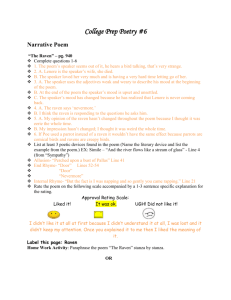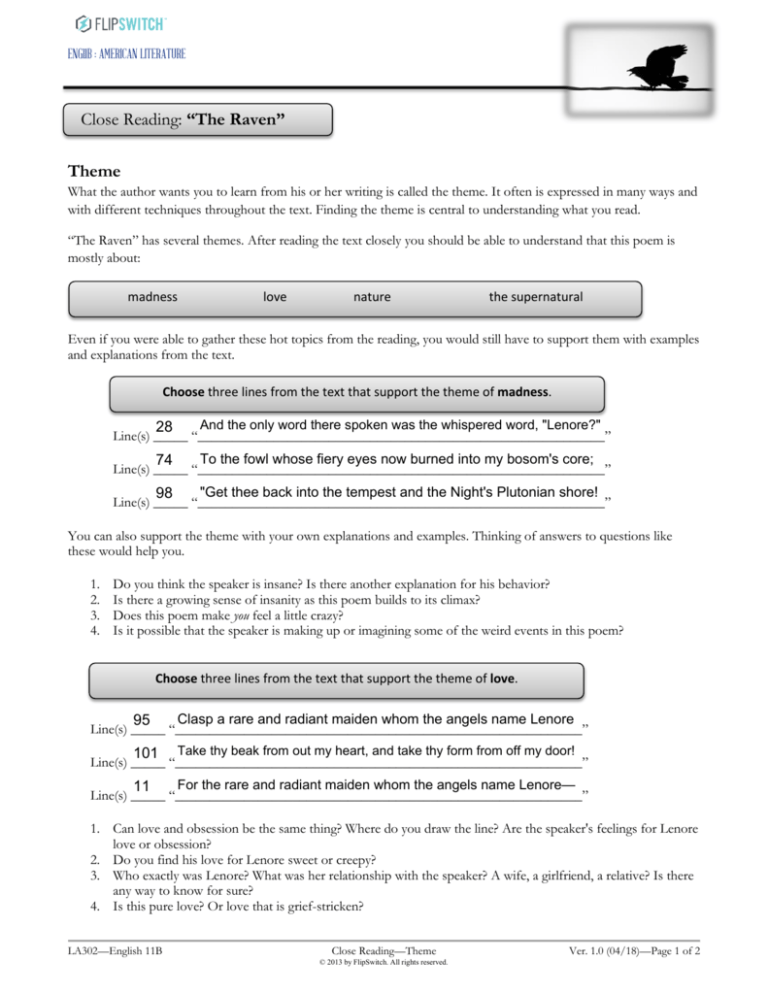
ENG11B : AMERICAN LITERATURE
Close Reading: “The Raven”
Theme
What the author wants you to learn from his or her writing is called the theme. It often is expressed in many ways and
with different techniques throughout the text. Finding the theme is central to understanding what you read.
“The Raven” has several themes. After reading the text closely you should be able to understand that this poem is
mostly about:
madness
love
nature
the supernatural
Even if you were able to gather these hot topics from the reading, you would still have to support them with examples
and explanations from the text.
Choose three lines from the text that support the theme of madness.
And the only word there spoken was the whispered word, "Lenore?"
28
Line(s) _____ “___________________________________________________________”
To the fowl whose fiery eyes now burned into my bosom's core;
74
Line(s) _____ “___________________________________________________________”
"Get thee back into the tempest and the Night's Plutonian shore!
98
Line(s) _____ “___________________________________________________________”
You can also support the theme with your own explanations and examples. Thinking of answers to questions like
these would help you.
1.
2.
3.
4.
Do you think the speaker is insane? Is there another explanation for his behavior?
Is there a growing sense of insanity as this poem builds to its climax?
Does this poem make you feel a little crazy?
Is it possible that the speaker is making up or imagining some of the weird events in this poem?
Choose three lines from the text that support the theme of love.
Clasp a rare and radiant maiden whom the angels name Lenore
95
Line(s) _____ “___________________________________________________________”
101
Take thy beak from out my heart, and take thy form from off my door!
Line(s) _____ “___________________________________________________________”
For the rare and radiant maiden whom the angels name Lenore—
11
Line(s) _____ “___________________________________________________________”
1. Can love and obsession be the same thing? Where do you draw the line? Are the speaker's feelings for Lenore
love or obsession?
2. Do you find his love for Lenore sweet or creepy?
3. Who exactly was Lenore? What was her relationship with the speaker? A wife, a girlfriend, a relative? Is there
any way to know for sure?
4. Is this pure love? Or love that is grief-stricken?
LA302—English 11B
Close Reading—Theme
© 2013 by FlipSwitch. All rights reserved.
Ver. 1.0 (04/18)—Page 1 of 2
ENG11B : AMERICAN LITERATURE
Close Reading: “The Raven”
Sound Devices
Poets use sound devices for a variety of reasons. In fact, researchers say that Poe stole the classic rhythmic style of
“The Raven” from a poem by Elizabeth Barrett Browning. He put his own twist on it, and “The Raven” remains a
cornerstone of poetic rhyme and meter patterns.
Sound devices are mostly used to:
suggest or imitate an image or action— “while I nodded nearly napping”
Can’t you see the speaker’s head dip down as he almost falls asleep?
help build a certain mood or feeling— “and the silken sad uncertain rustling of each purple
curtain”
Can’t you see the curtains rustling and moving in the wind? Pretty creepy!
Directions Each set of lines from “The Raven” contains examples of alliteration and examples of repetition. Read
each set of lines, and then describe the effect of the sound devices.
1. While I nodded, nearly napping, suddenly there came a tapping,
As of someone gently rapping, rapping at my chamber door.
“’Tis some visitor,” I muttered, “tapping at my chamber door…” (lines 3-5)
Effect:
The repeated "n" sounds suggest the act of falling asleep. The repetition of tapping and
rapping suggests the sounds of someone rapping at the door, and builds suspense.
2. But the silence was unbroken, and the stillness gave no token,
And the only word there spoken was the whispered word, “Lenore!”
This I whispered, and an echo murmured back the word, “Lenore!” (lines 27-29)
Effect:
The repeated "s" sound mimics the sound of a quiet whisper; the repeated words mimic
the echo the speaker hears. All of these soft, ominous sounds help build suspense.
3. “Prophet!” said I, “thing of evil! – prophet still, if bird or devil –
Whether Tempter sent, or tempest tossed thee here ashore,
Desolate yet all undaunted, on this desert land enchanted –
On this home by Horror haunted – tell me truly, I implore –
Is there – is there balm in Gilead? – tell me – tell me, I implore!” (lines 85-89)
Effect: The repeated sounds and phrases emphasize the intensity of the speaker's feelings
and suggest that he is going mad. They also bring the poem's suspense to a climax.
LA302—English 11B
Close Reading—Sound Devices
© 2013 by FlipSwitch. All rights reserved.
Ver. 1.0 (04/18/13)
ENG11B : AMERICAN LITERATURE
Choose three lines from the text that support the theme of nature.
86
Whether Tempter sent, or whether tempest tossed thee here ashore,
87
Desolate, yet all undaunted, on this desert land enchanted—
7
Ah, distinctly I remember it was in the bleak December
Line(s) _____ “___________________________________________________________”
Line(s) _____ “___________________________________________________________”
Line(s) _____ “___________________________________________________________”
1. Does the Raven push the speaker toward insanity or is the madness self-inflicted? Is it nature that is torturing
him, or his own mind?
2. Why did Poe use a raven instead of Lenore’s ghost as the symbolic character in this poem?
3. How is the scary side of nature represented in this poem? Why is that so important?
4. Is there anything really scary nature in this poem, or does the speaker create the terror in his mind?
Choose three lines from the text that support the theme of the supernatural.
14
Thrilled me—filled me with fantastic terrors never felt before;
Line(s) _____ “___________________________________________________________”
Doubting, dreaming dreams no mortals ever dared to dream before
26
Line(s) _____ “___________________________________________________________”
Swung by Seraphim whose foot-falls tinkled on the tufted floor.
80
Line(s) _____ “___________________________________________________________”
1.
2.
3.
4.
Do you think religion plays an important role in this poem?
Is the raven truly an evil spirit as the speaker thinks? Is there any evidence for this?
What about the raven is supernatural? Can anything in the poem be explained through science?
Does it seem like the idea of heaven provides any lasting hope in this poem?
LA302—English 11B
Close Reading—Theme
© 2013 by FlipSwitch. All rights reserved.
Ver. 1.0 (04/18)—Page 2 of 2
ENG11B : AMERICAN LITERATURE
Close Reading: “The Raven”
Closure. Pretty much all authors write so that you, the reader, will learn something. Discovering just what the
author wanted you to grasp from a text is the reason you take English classes in school. However, you don’t have to
guess at the point of a text, or answer a question about meaning without any prior knowledge. There are some
strategies you can put into practice to help you solve the puzzle of “What does this all mean?”
Summarize. Condensing and paraphrasing what you read either, in chunks or as a whole, definitely helps form
something vague and nebulous into something more solid. To make summarizing more fun, try looking at the reading
from a different point of view.
Example: Imagine that you are the raven. Summarize what happens in the poem from your point of view.
Use at least FOUR of the vocabulary words.
Sample Answer:
I came upon the only window in the city with candlelight still glowing behind it. Perching upon
the window "lattice" I knocked in order to gain entry. When the man inside opened the window,
I decided the white statue above the door would be a perfect place to find "respite" from my
travels. The man was odd. He looked lonely and asked me many questions. At first he smiled
at me in a cunning way. I thought then that he might be trying to "beguile" me into becoming
his pet. All birds fear the cage, and I know of no bird who would "placidly" be locked away,
unable to fly. But the man made no efforts to snare me. So I sat still on the statue, looking at
him. I answered his questions with the only call I knew, "nevermore." It is a call ravens have
when they seek to soothe. But the man became upset. He continued to grow anxious and
began pacing the room. He began shouting at me, and I in turn would answer him with my call.
"Nevermore," I would say. He grew more and more anxious. I wanted desperately to provide
the man some some comfort. Then it occurred to me that my mere presence might be the
"balm" he needed. I resolved that I should stay and keep him company, until such time that the
man might regain his composure and remain alone without sadness.
LA302—English 11B
Close Reading--Summarize
© 2013 by FlipSwitch. All rights reserved.
Ver. 1.0 (04/18/13)

